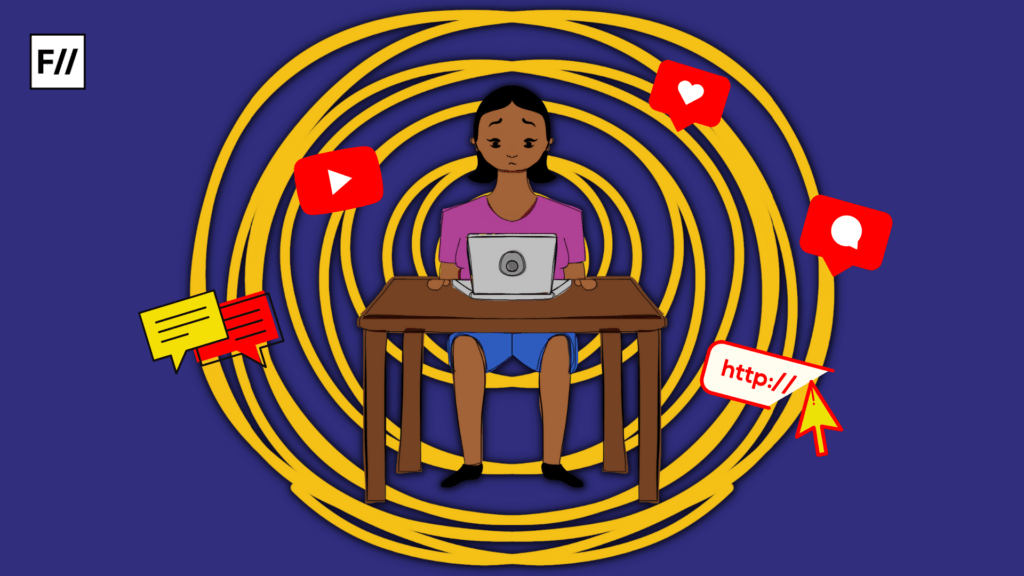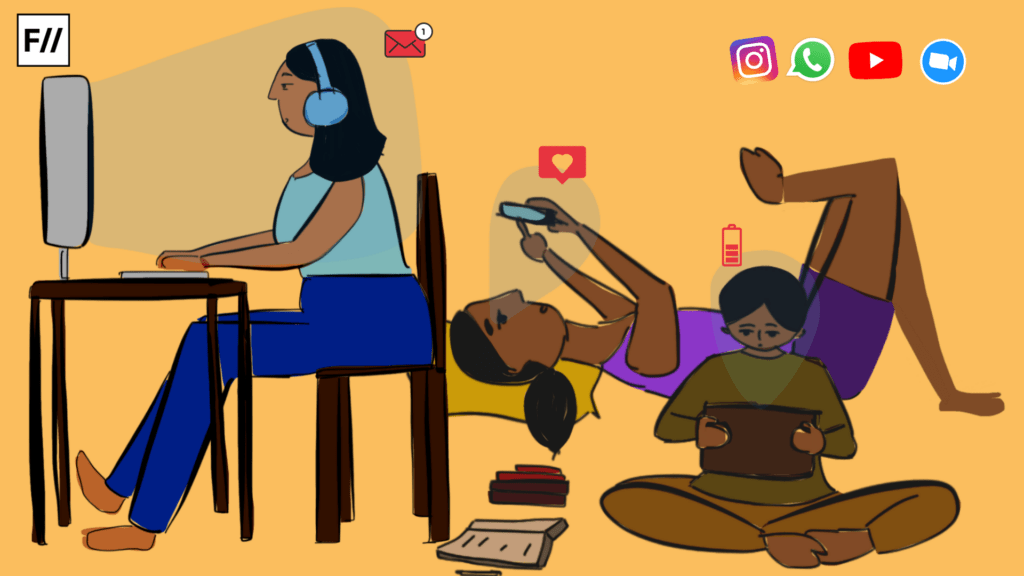As the country nears the end of its 16th general elections, the issue of women’s security has again resurfaced. Lately, the digital landscape has become more complex, especially for women who are more prone to trolling, online harassment, and privacy violations. Yet, their cybersecurity remains conspicuously absent from the national discourse.
The last many years of Modi government tenure have witnessed an increased surge in cyber threats targeting women. In 2022, an online gender-based violence incident – Sulli Deal came up. The open-source app auctioned the personal information and pictures of over 100 Muslim women without their consent. Similarly, Bulli Bai built on stolen pictures of women who voiced their opinions publicly, specifically those who raised their voices for social justice and minority issues, was launched.
The trend of hacking the social media handles of women users is another concerning area. Women users are losing their accounts to hackers at an alarming rate. The gravity of this situation was highlighted on the famous social media platform, Instagram. There has been a concerning surge in the hacking of Instagram handles, mostly targeting women. It could be one participating in an online poll or replying to an unknown user, the next moment your account is gone. This has instigated fear among women on social media with their privacy at stake.
Women users are losing their accounts to hackers at an alarming rate. The gravity of this situation was highlighted on the famous social media platform, Instagram. There has been a concerning surge in the hacking of Instagram handles, mostly targeting women. It could be one participating in an online poll or replying to an unknown user, the next moment your account is gone. This has instigated fear among women on social media with their privacy at stake.
With India transforming into a digital country and despite the growing concerns, the election manifesto which serves as a blueprint for the country’s future, fails to address women’s cybersecurity. While sections on women’s empowerment and technology innovation are included, the absence of specific provisions for women’s online safety is a glaring oversight in the Bhartiya Janta Party manifesto (Sankalp Patra).
Cybersecurity in policy
According to a report published in Feb 2024, by statista.com, the capital city of Delhi has reported over 800 cases of women harassment cases in India in 2022 alone. Despite the National Cyber Security Policy, issued in 2013, followed by the National Cyber Security Strategy (2020), the absence of any specific legislative framework made to tackle cyber crimes against women remains a question to many. The government needs to revise the 2013 policy and adopt a comprehensive strategy to address the entire spectrum of the cybersecurity issue.

The hackers have taken advantage of loopholes to invade privacy and wreak mayhem, underscoring the urgency of addressing these concerns. Samra Khan, an undergraduate student of psychology narrated the line of events in which her account was hacked.
‘I received a message from a friend, apparently her account was already hacked but I had no clue about it because there was no suspicious activity done. She texted me to vote for her in some advocacy thing. It seemed pretty legit to me because I have been asked to vote for other people too, so I logged in to my Instagram to do the same. I entered my password, and even after several attempts it was showing incorrect. It was then I realized that my account was hacked,’ Samra tells FII.
Khan, who is 19 years old had a private account on Instagram, however, all her details were made public once her account got hacked. ‘I asked my friends to report that account immediately so that it could be removed permanently, however, in the coming days I got an official mail from Instagram stating that they found nothing wrong with the account, so it cannot be removed. I had around 500 followers and it was a private account. But when it was hacked they made my account public and all my photos were out there, yet I couldn’t do anything about it.’
The chairperson of the National Commission of Women states that 98 per cent of cybercrimes are carried out against women. Although the Information Technology Act of 2000 was the first to address IT crimes, it was not without flaws such that our country does not have a specific legislative framework in place to prevent cybercrime against women.
The consequences of such breaches extend beyond mere inconvenience and borders. Yasmeen Andrabi, a resident of Srinagar, recounts the distress of having her account hacked, ‘I got very tense when my sister informed me that my account got hacked. Though I only had around 190 followers, it was one of my oldest accounts. I had it even before I signed up on Facebook.
Andrabi, 55 a homemaker was afraid that all the data on her phone had been leaked, ‘Since I am not tech-savvy, I thought my phone was hacked and all my private information was leaked and I panicked. I was ready to even change my phone.’
The plethora of account hacking and the obviosity of online harassment have made citizens anxious. While the BJP’s manifesto has a thorough list of guarantees across several sectors, one noteworthy omission is a mention of cybersecurity measures aimed at ensuring the safety and empowerment of women online. This is an era when digital platforms are ubiquitous and the party’s failure to implement specific initiatives to protect women from cyber threats and harassment highlights a gap in its commitment to gender equality and security.
The need for a legislative framework
The party’s comprehensive commitment to empowering all societal segments in the Sankalp Patra (manifesto) should have been highlighted by the deliberate inclusion of measures targeted at improving women’s cybersecurity, especially in light of the increasing concerns about cyberbullying, online harassment, and privacy violations experienced by women all over India

Cyber experts warn that the rising cyber threats, especially against women do not just jeopardise privacy but are also a threat to their security and well-being. They emphasise the significance of establishing strong security measures, such as two-factor authentication, to strengthen online defences. To add a degree of security against criminal activity, experts advise linking phone numbers to their social media accounts.
‘The increasing risk of data breaches and cyber threats should remind people to exercise heightened vigilance, and the apps should further increase their security measures. This is not just a violation of privacy for women but also a threat to their safety and well-being,’ says Asif Khan who has been a resident of Delhi for more than 8 years. Khan, now 24, works as a Technical Lead in a Canadian cybersecurity startup stating that the IT Act makes identity theft a punishable offence. Under this provision, whoever, fraudulently or dishonestly makes use of the electronic signature, password, or any other unique identification feature of any other person, shall be punished with imprisonment.
‘The person who hacked my account texted my followers saying “I need some money, please transfer it using the following link.” They attached a link to an online payment gateway. One of my close friends, who thought I needed the money, sent ₹30,000 to the hacker’s account. When I heard this, I was shocked and helpless,’ stated Tanzeel Rafiqi, a 41-year-old resident of Sanat Nagar, Srinagar.
Users all across social media are getting fooled by such messages that too from the handles of their known. This raises trust issues in people who want to be a contributor to fundraisers and polls. Ironically women find themselves the most affected in this suppression too.
‘To address these risks and maintain a safe and inclusive digital environment for all users, policymakers and technology corporations must work together. Other individuals also need to be informed. They should enable two-factor authentication and link their accounts with their phone numbers and email addresses,’ added Khan.
Call for a collaborative action
Will India achieve growth by neglecting cyber security and gender-based harassment? In the mission of making India the 3rd largest economy by strengthening the economic front, the societal front has been kept on the back foot with less weightage to digital aspects.
A survey conducted by OOSGA in October 2023 found 470.1 million active users of social media in India. With WhatsApp, Instagram, and Facebook being the top three handles in 2021, Instagram has held the first position since 2022. An increase of 4.2 per cent in users has been noticed in recent years, who use social media as a medium for news.
Action towards securing digital spaces, especially for women has become the need of the hour. For several women users, social media has become their newfound freedom where they tend to express and take agency of their own lives freely.
India, which has been working towards ending the digital divide will only find the gender gap widening with the alarming rate of social media-generated anxieties. This will ultimately become a leading factor in diminishing the participation of women in the social sphere.




